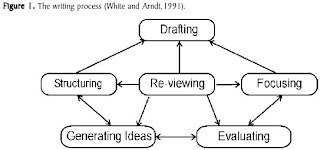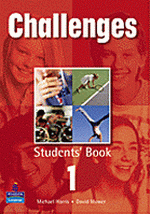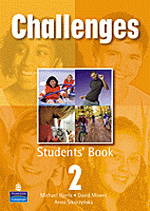I'll also make reference to Arndt & White's model for writing, a process of interrelated stages which is generally represented diagramatically like this:
 Of particular interest to me are the difficulties in implementing 'process writing' in our classrooms. Here are some which I find the most salient:
Of particular interest to me are the difficulties in implementing 'process writing' in our classrooms. Here are some which I find the most salient:- Time constraints: According to Hedge, '...setting aside the time needed for feedback, and for the revision of several drafts, is unrealistic, particularly within the constraints of school systems, and particularly where classes are large.' On the whole, I agree with this. Even in small classes, say of 10-15 students, implementing process writing can be time-consuming. For a teacher to monitor 10 pieces of writing, give detailed and fair feedback, conferencing with students, etc is bound to demand long periods of class-time. If we consider that most of our syllabuses are 'language systems-oriented', where we need to set some time to the teaching of grammar and its practice, vocabulary and its practice, plus all the other skills - especially speaking - writing is traditionally relegated to, at most, a careful presentation, the students writing for homework, and handing it in to the teacher for (one-time) 'correction'. The development of a process writing programme will need more time if it is to be given its full importance and is expected to render success.
- Size constraints: Similar to the time limitations, the number of students in a class will influence the practicalities of implementing this methodology. How much personalised and comprehensive feedback can a teacher give to 25 students in an 80-minutes period? Will all students recieve the same amount of attention and time? Will all students need/profit from the same amount of teacher's dedication?
- Is process writing necessary/realistic in all situations?: Process writing is a very helpful technique for FL students who have and can afford the time to polish and improve their writing skills, especially for academic purposes. However, learners also need to develop the ability to write under time constraints, to prioritise certain things, and to know which strategy is more useful in which situation. For example, process writing, especially in the first years of learning a language, can help develop writing skills for e-mails (formal & informal) or personal blog posts, but these are texts which, nowadays, we are expected to, or want to, take fewer and fewer time in writing. Even in some academic situations, students will need to produce written material under short periods of time. However, a point for process writing here would be that, precissely because of that, learners need to be taught, from an early stage, effective process writing skills, which can later 'automatise' to produce appropriate written material in a short time...
- Personalisation: Is process writing suitable for everyone? The 'suitability' question actually applies to all and every one practice teachers (of all subjects) implement in their practice - it's an overall educational question (Does whatever we do suit all my students?). In the case of writing, it has been observed that successful writers do engage in a process of some form whe they write, and that the general stages are similar to the ones proposed by Hedge, White & Luppi, and Arndt & White. If our responsibility is to facilitate our learners' learning process - in this case, writing - I believe that process writing can greatly contribute to that development (we need to find some framework!). Perhaps the implication here for the teacher is that not everyone will follow a neat and linear sequence of 'generating ideas-planning-drafting-reviewing-focusing-evaluating' (this is, in general, my way ;-)!). In fact, in Arndt & White's model, it is acknowledged that a writer may begin 'their' writing process at any stage, but the strategies observed are generally the same. This is something which the five writers seem to agree on.
All in all, I believe that the models presented by Hedge and by White & Luppi reflect current trends in the teaching of writing in FLs. In general, White & Luppi's clear ideas do reflect many of the stages I follow in my own teaching. They convey the fact that writing (like all language skills) must always have a communicative purpose, which should help our students see the task as meaningful and relevant. However, there is a further step that we need to take: to make the writing task as not only something the we need (or may need) to do at school, university, or at work. These specific objectives can easily be percieved by adult learners. But it is everyone - teens and adults - who can be helped to discover that writing can be a pleasurable and rewarding experience. Nowadays, with the development of the new ICTs, the possiblities of writing in a FL to share what you think, believe and feel are constantly expanding. It is up to teachers to discover and explore these possibilites, and to motivate learners to make the most of them for their own linguistic, professional and personal growth.

"Writing is long periods of thinking and short periods of writing." ~ Ernest Hemingway




